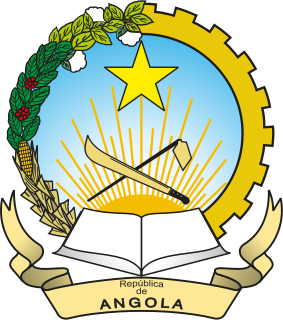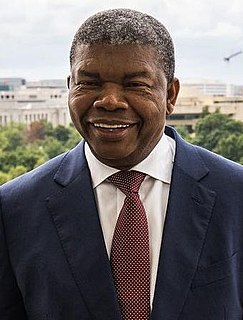| |||||
| Centuries: | |||||
|---|---|---|---|---|---|
| Decades: | |||||
| See also: | List of years in Angola | ||||
Events in the year 2019 in Angola .
| |||||
| Centuries: | |||||
|---|---|---|---|---|---|
| Decades: | |||||
| See also: | List of years in Angola | ||||
Events in the year 2019 in Angola .


Angola, officially the Republic of Angola, is a country located on the west coast of Southern Africa. It is the second-largest Lusophone (Portuguese-speaking) country in both total area and population, and is the seventh-largest country in Africa. It is bordered by Namibia to the south, the Democratic Republic of the Congo to the north, Zambia to the east, and the Atlantic Ocean to the west. Angola has an exclave province, the province of Cabinda, that borders the Republic of the Congo and the Democratic Republic of the Congo. The capital and most populous city is Luanda.

The current political regime in Angola is presidentialism, in which the President of the Republic is also head of state and government; it is advised by a Council of Ministers, which together with the President form the national executive power. Legislative power rests with the 220 parliamentarians elected to the National Assembly. The President of the Republic, together with the parliament, appoints the majority of the members of the two highest bodies of the judiciary, that is, the Constitutional Court and the Supreme Court. The judiciary is still made up of the Court of Auditors and the Supreme Military Court.

Angola is a country in southwestern Africa. The country's name derives from the Kimbundu word for king. Angola was first settled by San hunter-gatherer societies before the northern domains came under the rule of Bantu states such as Kongo and Ndongo. In the 15th century, Portuguese colonists began trading, and a settlement was established at Luanda during the 16th century. Portugal annexed territories in the region which were ruled as a colony from 1655, and Angola was incorporated as an overseas province of Portugal in 1951. After the Angolan War of Independence, which ended in 1974 with an army mutiny and leftist coup in Lisbon, Angola achieved independence in 1975 through the Alvor Agreement. After independence, Angola entered a long period of civil war that lasted until 2002.

José Eduardo dos Santos was the president of Angola from 1979 to 2017. As president, dos Santos was also the commander-in-chief of the Angolan Armed Forces (FAA) and president of the People's Movement for the Liberation of Angola (MPLA), the party that has ruled Angola since it won independence in 1975. He was the second-longest-serving president in Africa, surpassed only by Teodoro Obiang Nguema Mbasogo of Equatorial Guinea.
Articles related to Angola include:

Group Sonangol is a parastatal that formerly oversaw petroleum and natural gas production in Angola. The group consisted of Sonangol E.P. and its many subsidiaries. The subsidiaries generally had Sonangol E.P. as a primary client, along with other corporate, commercial, and individual clients. Angola is estimated to have over 5 billion barrels (790,000,000 m3) of offshore and coastal petroleum reserves, and new discoveries are outpacing consumption by a 5-to-1 ratio.
Ismael Abraão Gaspar Martins is an Angolan diplomat and political figure who has been Angola's Permanent Representative to the United Nations since 2001. Previously he was Minister of Finance from 1977 to 1982, Minister of External Trade from 1982 to 1987, and Executive Director of the African Development Bank from 1989 to 1995.

Isabel dos Santos is an Angolan businesswoman, the eldest child of Angola's former President José Eduardo dos Santos, who ruled the country as a dictator from 1979 to 2017. Once considered Africa's richest woman according to Forbes magazine, with a net worth exceeding US$2 billion, she was dropped from the magazine's list in January 2021 after the freezing of her assets in Angola, Portugal and the Netherlands. She owes $340 million to the Portuguese company PT Ventures.
In the Angola–Cuba Declaration of 1984, signed 19 March 1984 in Havana by president José Eduardo dos Santos of Angola and Fidel Castro, premier of Cuba, the two countries agreed to the withdrawal of Cuban forces from Angola after the withdrawal of South African troops from Angola and Namibia, and after UN-Security Council resolution 435 on Namibian independence was strictly applied.

Angola and Portugal are members of the Community of Portuguese Language Countries and the United Nations.

The 30-year civil war and 20 years of Soviet command economy has caused notable amounts of institutional damage to the state and public at large and produced a centralized government with authoritarian tendencies that has made possible the ownership of the nation's resources by the president and his associates. This has resulted in the office of the presidency using the government apparatus to allow themselves and their patronage networks a variety of legal and extra-legal options to extract private profit from Angola's economy.
Fractionism was a political movement in Angola during the 1970s.

Manuel Domingos Vicente is an Angolan politician who served as the vice president of Angola between September 2012 and September 2017. Previously he was chief executive officer of Sonangol, Angola's state oil company, from 1999 to 2012, and he briefly served in the government as the minister of State for Economic Coordination in 2012.

Unitel S.A. is a private Angolan mobile phone company which was established on 8 March 2001 as a joint-stock company. The company is owned by Oi and Helios, Angolan state-owned oil company Sonangol and local firms like Geni holding, and Vidatel owned by Isabel dos Santos, each holding 25% of Unitel. Tony Dolton is the Executive Director of Unitel since September 2013.

Angola–India relations refers to the international relations that exist between Angola and India.
Jose Filomeno de Sousa dos Santos is an Angolan businessman, and the son of Angola's former President José Eduardo dos Santos, who ruled the country from 1979 to 2017. He was the chairman of Fundo Soberano de Angola (FSDEA), Angola's sovereign wealth fund, was appointed to the board in 2012, and succeeded Armando Manuel as Chairman in June 2013.

João Manuel Gonçalves Lourenço is an Angolan politician, who has served as the president of Angola since 26 September 2017. Previously, he was Minister of Defence from 2014 to 2017. In September 2018, he became the Chairman of the People's Movement for the Liberation of Angola (MPLA), the ruling party. He was the party's Secretary-General from 1998 to 2003.
This article discusses the main players in the oil economy in Angola as well as the political economic history of oil dating back to 1955. Angola is approaching middle income status with a GDP per capita of about $4,100. Angola has the second largest oil reserves in Africa; its oil industry is highly modern and sophisticated. Sonangol, the national oil company, is the dominant player in the oil industry. Some argue that Sonangol funds the one-party state's political machine. Outside of the oil industry, the Angolan economy, particularly the private sector and financial system, is largely undeveloped and uncompetitive. Some political scientists have characterized Angola as a "successful failed state" given the country's high levels of oil wealth and low levels of human development and public service delivery.
Events from the year 2020 in Angola.